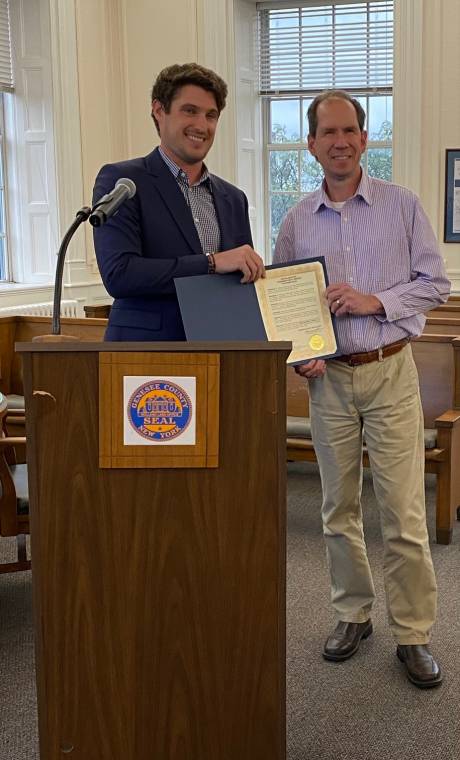When Shelley Stein heard about Senate Bill 9509 to eliminate the Farm Laborers Wage Board, she had to jump on it immediately, she says.
The 2019 Farm Workers Fair Labor Practices Act contained a provision to create a Wage Board to evaluate lowering the overtime threshold for farm laborers below 60 hours a week. In January 2022, the Wage Board recommended lowering the threshold to 40 hours over 10 years starting in 2024.
Not only was the Wage Board’s creation and the ensuing recommendation ill-conceived, but the provision also went against the majority of public hearing testimony that opposed the board in the first place, Stein said Wednesday.
“(Testimonies) indicated that nobody wanted any change to the overtime threshold of 60 hours of the work week, that was from farmers, farm workers and industry stakeholders. However, the wage board did vote to reduce the number of hours and to continue to reduce it until it got down to 40 hours of work,” she said during the Ways and Means meeting. “The Commissioner of Labor has been given the responsibility to make the final determination and what this Senate bill does is, it recognizes that there is only one person who is familiar with agriculture on the three-member board. Their actions do not mirror what the major request was during this process. And so, it’s time to throw out the wage board.”
Legislator Christian Yunker, also from a farming family, agreed, adding that the wage board had flaws from the start.
“The idea of the wage board was a set-up from the beginning,” he said. “And it is timely because we're late on the way here … and so any noise we can make throughout the state is fantastic.”
The Genesee County Legislature chairwoman and part of the family-run Stein Farms in Le Roy knows that of which she speaks. An average farm work week is 60 to 65 hours, she said, and the first proposed cut shaves up to nine hours off of that with a total of 56 hours a week. The state is supposed to make up for those hours worked between the maximum and 60, which would mean paying out time and a half for each worker (four hours a week) on each farm in the state. The reduction of hours goes down from there, for an eventual maximum of 40/week, which means the state is to pick up even more hours in the future.
Though she has concern about whether the state is really financially equipped to pay out the difference, it isn’t Stein’s primary reason for opposing the Wage Board conception. It will damage Genesee County’s economy for years to come, she said, and the “good work that farms are doing for climate change will be lost forever.”
The committee agreed to support the bill that was just established on July 25, and it will be forwarded on to the whole Legislature for vote during its meeting on Aug. 24. An adopted resolution will then go to an inter-county consortium of 13 Western New York counties, and to stakeholder agricultural groups for further support and endorsement, Stein said during an interview with The Batavian after the meeting.
“And then, as the result indicates, we will be sending this on to the governor and to the Senate majority leader Andrea Stewart-Cousins, and also our assembly speaker, Mr. (Carl Heastie), along with our local representatives who we know feel the same way that we do, and and we are assured of their continued support.,” Stein said. “The wage board not taking into consideration 70 percent of the testimony, and doing exactly the opposite, makes no sense to how our democracy is supposed to work. And here in New York State, of course, the area where we are known for making and producing food to feed the rest of our state, it makes us shake our head because this puts food at risk.”
She is hopeful that such resolutions to eliminate the Wage Board will sway the governor and downstate elected leaders, since (they) do not want to put their constituents at risk "any more than we do" with food.
“Part of what really will hurt them is the fact that farmers are the largest donation source for food pantries and New York State feeding programs, especially Nourish New York. What this overtime threshold reduction of ours does is it puts at risk those programs that New York State touts and is so proud of, but they don't happen without the produce coming from the farms,” she said. “So this is a balancing point. And we recognize that in agriculture, but we also recognize that our workers want to work. And that is the American Dream for them that they are reaching to, and they are aspiring to, and for the New York State government to be determining when you can work and how long you can work in a field that has seasons. It does have the plant that determines the season, or the animal that determines the season.”
Does this create competition with other states, since migrant workers may want to work elsewhere without a weekly limit?
“That is an issue, and a lot of the articles that you'll see being released in the media currently is that those who follow a crop are avoiding New York State because their wages are being held down by foreign producers who are price takers of their product, and cannot keep up with the overtime hours required after 60 hours in a week. So those states like Pennsylvania, and Ohio, and Massachusetts, and Vermont, are really benefiting from the great skill sets that we had developed here in New York State,” Stein said. “And those workers are off to Michigan, and they're off to Ohio and Wisconsin. And some of them even into Canada, which of course makes that international competition. And it's a disadvantage that our state is actually putting the farmers under at this point.”
A Commissioner of Labor is appointed, and a union leader is elected by union members, but Stein takes issue with the “one sole agricultural involved person” who represents agricultural interests.
“Our Commissioner of Agriculture certainly should have had a position on this wage board so that there could be an actual balance at the start,” she said. “New York State already imposes a higher minimum wage than any of the states around us. So we start off already being disadvantaged and on a back foot, because the farm gate prices do not allow us to set our prices for our foodstuffs that we are so proud to make here in New York.”
Even if the new farm bill is successful, the weekly working cap could remain, yes?
“The cap could remain. However, I would think and I would hope and have faith that then that would actually be repealed,” she said. “We have learned to live at the 60-hour threshold; it is not easy. We are limiting the hours of our staff, and we are paying overtime to staff at a much higher minimum wage rate than most other states around us. And anecdotally, when our staff go to file their taxes — and this is staff that works year-round — they're told that they actually earn too much to be afforded any help through any programs that might have been available to any other citizen of a community of New York State. So the reality check needs to happen as to the income levels of our farm workers, and to recognize that they are well paid for the work that they come here to do so that they can provide for their families back home.”
“And if they intend to work just six months a year and have six months of the year off, they are willing to do the work in that vein, and that is their preference. It is hard for me to understand how the state can say that they're ready to pay the difference between the 60 hours and the first reduction to 56 hours. I don't know of any other private industry that the state is willing to pay payroll for that aren't state workers,” she said. “So all of this is very messy. And it need not be if the government would just step out of the food production hours of labor, we would all be better off here in New York State. And we could continue to provide that high-quality local food on the precious ground that we have here, especially in the Finger Lakes area, because we are making the highest and best use out of our natural resources, our land and our water here.”
Stein is grateful for her fellow legislators’ support, and that of state Assembly leaders on the Agricultural Committee and Senator George Borrello (R, C, I, LIBT), who is promoted as “an unwavering advocate for rural New Yorkers and a champion of agriculture” and is behind the farm bill, she said.
“There are a lot of moving parts in this. And it could just be simpler by the removal of that decision of the wage board, and also the wage board itself,” she said. “That's our issue today. And that's our request.”
The resolution will move onto the Legislature next week. It reads, in part:
“Whereas, Genesee County is urging state legislature to provide the farmers and farm workers relief from the already onerous burden the Farm Workers Fair Labor Practices Act and other existing government mandates which have placed our farms at a competitive disadvantage with neighboring states and Canada. Now, therefore, be it resolved Genesee County emphatically opposes any decrease to the 60-hour farm worker overtime threshold proposed by the Farm Laborers Wage Board.
Be it further resolved, Genesee County urges Governor Hochul to strongly consider Senator Borrello’s request of repealing the act, section 674-a of the labor law, relating to establishing the Farm Laborers Wage Board and eliminating the three-member Farm Laborers Wage Board.
Furthermore, be it resolved, Genesee County Legislature directs the Clerk of the Legislature to submit a copy of the adopted resolution to Governor Hochul, Senate Majority Leader Stewart-Cousins, NYS Assembly Speaker Heastie, Assemblyman Hawley, Senator Borrello, Senator Rath, NYS Labor Commissioner, NYS Agriculture and Markets Commissioner, NYS Farm Bureau, Genesee County Farm Bureau, NYSAC and Inter-County Association of Western New York.”
File Photo of Genesee County Legislature members, with Chairwoman Shelley Stein, front, who is urging county and state leaders to support a farm bill that would repeal the current Farm Laborers Wage Board.











